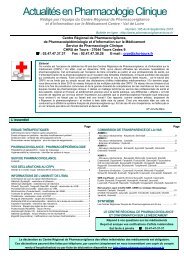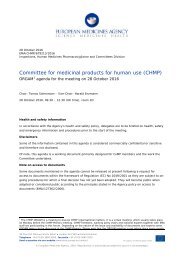ongoing
2m0f7Nw
2m0f7Nw
You also want an ePaper? Increase the reach of your titles
YUMPU automatically turns print PDFs into web optimized ePapers that Google loves.
formulations or routes of administration to existing marketing authorisations. Extension applications<br />
follow a 210-day evaluation process, similarly to applications for new medicines (see figure above).<br />
Type II variations - Extension of indication procedures (section 5)<br />
Type II variations are applications for a change to the marketing authorisation which requires an<br />
update of the product information and which is not covered in section 4. Type II variations include<br />
applications for a new use of the medicine (extension of indication), for which the assessment takes up<br />
to 90 days. For the applications listed in this section, the CHMP may adopt an opinion or request<br />
supplementary information from the applicant.<br />
Ancillary medicinal substances in medical devices (section 6)<br />
Although the EMA does not regulate medical devices it can be asked by the relevant authorities (the<br />
so-called Notified Bodies) that are responsible for regulating these devices to give a scientific opinion<br />
on a medicinal substance contained in a medical device.<br />
Re-examination procedures (new applications) under article 9(2) of regulation no 726/2004<br />
(section 3.5)<br />
This section lists applications for new marketing authorisation for which the applicant has requested a<br />
re-examination of the opinion previously issued by the CHMP.<br />
Re-examination procedures (section5.3)<br />
This section lists applications for type II variations (including extension of indication applications) for<br />
which the applicant has requested re-examination of the opinion previously issued by the CHMP.<br />
Withdrawal of application (section 3.7)<br />
Applicants may decide to withdraw applications at any stage during the assessment and a CHMP<br />
opinion will therefore not be issued. Withdrawals are included in the agenda for information or<br />
discussion, as necessary.<br />
Procedure under article 83(1) of regulation (EC) 726/2004 (compassionate use) (section 7)<br />
Compassionate use is a way of making available to patients with an unmet medical need a promising<br />
medicine which has not yet been authorised (licensed) for their condition. Upon request, the CHMP<br />
provides recommendations to all EU Member States on how to administer, distribute and use certain<br />
medicines for compassionate use.<br />
Pre-submission issues (section 8)<br />
In some cases the CHMP may discuss a medicine before a formal application for marketing<br />
authorisation is submitted. These cases generally refer to requests for an accelerated assessment for<br />
medicines that are of major interest for public health or can be considered a therapeutic innovation. In<br />
case of an accelerated assessment the assessment timetable is reduced from 210 to 150 days.<br />
Post-authorisation issues (section 9)<br />
This section lists other issues concerning authorised medicines that are not covered elsewhere in the<br />
agenda. Issues include supply shortages, quality defects, some annual reassessments or renewals or<br />
type II variations to marketing authorisations that would require specific discussion at the plenary.<br />
Referral procedures (section 10)<br />
This section lists referrals that are <strong>ongoing</strong> or due to be started at the plenary meeting. A referral is a<br />
procedure used to resolve issues such as concerns over the safety or benefit-risk balance of a medicine<br />
or a class of medicines. In a referral, the EMA is requested to conduct a scientific assessment of a<br />
Committee for medicinal products for human use (CHMP)<br />
EMA/CHMP/117089/2017 Page 38/39




